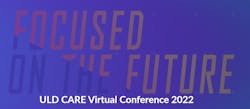ULD CARE wants to bring back a culture of responsibility for unit load devices (ULDs) across the cargo system.
Bob Rogers, vice president and treasurer at ULD CARE – a not-for-profit organization focused on improving ULD use throughout the air cargo operations, emphasized this fact during ULD CARE’s 2022 Virtual Conference March 29.
“We all know when it comes to ULD, it falls far, far, far down the food chain, and basically very few people really drive any real responsibility,” said Rogers.
Achieving a culture of responsibility means putting control back into the hands of the airlines, said Rogers, who served as the keynote speaker during virtual conference.
“We need to introduce some new technologies and we need to foster a respect for ULD operational knowledge,” he added. “It’s not just a box to be pushed around by a forklift. It has to be treated properly.”
The theme of conference was “Focused on the Future.” Rogers outlined ULD CARE’s plan for the future, which includes six initiatives.
1 – Taking back control through an industry-wide demurrage system
“It’s no secret because we’ve been talking about it for years,” Rogers said. “Off-airport operations are a major risk for ULD. We all know about it.
“The slow returns – ULDs sitting in the corner of a freight forwarder’s shed for weeks and even months.
“Unreported damage – ULDs get damaged off-airport and they just get dumped back on a terminal dock.”
This also includes “borrowing” of ULDs by freight forwarders, he said.
ULD CARE advocates “taking back control” of ULDs through an industry-wide demurrage system that levies charges when ULDs are not returned within an allotted time. Rogers pointed out charges for ULDs are included in the International Air Transport Association (IATA) manual titled, “The Air Cargo Tariff Rules (TACT) Solutions.”
Section 4.8 outlines Unit Load Devices Charges and gives examples of charges that might be levied: demurrage, replacement or repair, tracking and retrieval, ULD receipt and checking, animal stall surcharge, one-way surcharges.
2 – Establishing industrywide KPIs (key performance indicators)
“The saying is, ‘You can’t manage it, if you can’t measure it,’” Rogers said. “And that has to be true for ULD operations because how does any airline really know how well they are really doing if they’re only looking at their own data? How do they know if it measures up?”
Supply chain shortages have made headlines around the world.
“The headlines have been primarily focused on problems in ocean shipping,” he said, “but the problems are just as significant in air, they just don’t make the headlines quite so much.”
On one hand, Rogers said air cargo and ULD operations grow and on the other hand ULD management resources are squeezed.
“Fewer and fewer airlines really give sufficient attention to having a capable, sufficient ULD management team,” he said. “Then it just comes down to crisis management.”
The solution he said is using ULD CARE’s independent position in the industry to collect, anonymize and then distribute industry data on KPIs including: ULD losses, utilization rates, ownership costs, as well as cargo strap consumption and shipsets per aircraft.
“How many ULDs do you have for every space on the aircraft that is actually earning you money?” he said.
3 – ULD CARE’s social media presence
“We need to rebuild and refocus our communications,” Rogers said. “We are working with our website provider, King Communications, who we’ve been with for many years, and we are now launching ourselves into a more sophisticated social media presence on Facebook and LinkedIn.”
4 – Apps
“Apps are synonymous with everyday life,” Rogers said. “We all want to conduct business on the fly.”
How many ULD events go on inside an office?
“The short answer is there aren’t any,” he replied. They all go on on the fly. In a warehouse, on the ramp, on a truck dock. If we’re going to collect accurate, real-time data and transmit it to the place, it needs to be, apps are the way forward.”
5 – Coaching and Training
“ULD know-how is probably at an all-time low given the massive turnover that’s occurred during COVID,” Rogers said. “Even before COVID, there was a problem, turnover in the ground handling industry was already notoriously high.”
The question he said is how can the industry deliver widespread cost-effective and measurable training for ULD operations. The answer, Rogers believes, includes financing and motivating the industry to use the training and technology available.
“Virtual Reality is a very interesting area and I think shows a lot of potential for delivering low-cost, affordable, measurable ULD training,” he said during the keynote address.
6 – Sustainability
Last but not least, Rogers said sustainability is a high priority for the industry.
“When I started in ULDs in the 1980s, a LD3 (container) came in at about 130 kg, they’re now 55 kg. So, the industry in some ways has come a long way – certainly in weight reduction which is the biggest factor of all.”
But, he said more could be done if the ground handling process was not so damaging to the equipment.
“There’s just a massive amount of waste in the air cargo industry,” Rogers added. “You only have to walk around the average cargo terminal or freight shed. You’ll see damaged nets being thrown away, millions of cargo straps thrown away every year and all sorts of waste involved in the whole process of ULDs being damaged and repaired.”
His biggest pet-peeve is cargo straps. He estimates about 2.5 million a year are being produced (2,100 tons of steel or more, 4,000 tons of CO2 and 22 Km of webbing). He suspects not even 10 percent of the straps are used for their total allowable lifetime.
“They get used a couple of times and then somehow go off-piste and end up in a corner of a freight forwarder’s shed and ultimately when there’s a cleanup, end up in landfill. This is just appalling that this goes on.”
With these six initiatives, Rogers said ULD CARE is focused on the future.
About the Author
Rebecca Kanable
Assistant Editor
Rebecca Kanable, a veteran journalist, worked with Endeavor Business Media's aviation group from 2021 to 2024 as assistant editor of Airport Business, AMT and Ground Support Worldwide. She previously worked for various publications, including trade magazines and newspapers.


